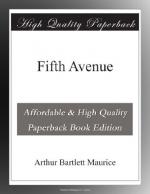Years ago, to find the tangible New York Bohemia would have been a matter of crossing from the Avenue’s southern extremity, and diving into the streets that lie to the south of Washington Square. There was the old French Quarter, and there foregathered the professional joke-makers and the machine poets who contributed to “Puck,” and the “New York Ledger” when that periodical felt the guiding hand of Robert Bonner. Of that group Henry Cuyler Bunner was probably the most conspicuous. In his early days he was a twenty-four-hour Bohemian. In later life, when he had moved to the country, he remained a noon Bohemian. He was the prime spirit of the little Garibaldi in MacDougal Street of which James L. Ford wrote in “Bohemia Invaded.” Not often did he stray over to Greenwich Village. He disliked what he called its bourgeois conservatism.
For a period of years that section immediately to the south of the Square was the French Quarter. There were the peaceful artisans, and also there were political refugees of dangerous proclivities, men who had had a share in the blazing terrors of the Commune, and who, in some cases, had paid the price in years of imprisonment under the tropical sun of Cayenne. In all their wanderings they had carried the spirit of revolution with them and spouted death to despots over their glasses of absinthe in cellar cafes. William H. Rideing, in an article which was published in “Scribner’s Magazine” for November, 1879, described these men as he had found them in the Taverne Alsacienne in Greene Street: “gathered around the tables absorbed in piquet, ecarte, or vingt-et-un ... most of them without coats, the shabbiness of their other garments lighted up by a brilliant red bandanna kerchief or a crimson overshirt.” Keen glances were shot at strangers, for the tavern had a certain clientele outside of which it had few customers and suspicion was rife at any invasion. “They are drinking wine, vermouth, and greenish opaline draughts of absinthe. Staggering in unnerved and stupefied from the previous night’s debauch, they show few signs of vitality until four or five glasses of the absinthe have been drunk, and then they awaken; their eyes brighten and their tongues are loosened—the routine of play, smoke, and alcohol is resumed.”




